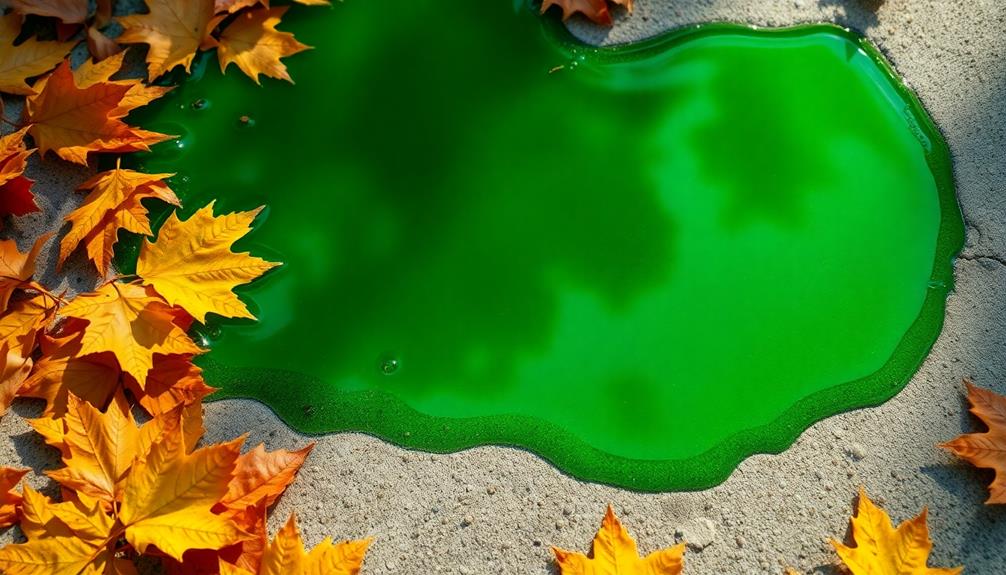Antifreeze smells sweet and syrupy, often likened to candy or maple syrup. This delightful scent actually serves as a warning sign for your vehicle. If you catch a whiff of this aroma, it could mean there's a coolant leak—potentially from a cracked hose or failing heater core. You might notice the smell in your garage, especially during colder months. It's essential to address this quickly, as it can lead to serious engine damage. So, if you want to ensure your vehicle stays healthy and safe, let's explore how to identify and handle antifreeze odors effectively!
Key Takeaways
- Antifreeze has a sweet, syrupy smell similar to candy or maple syrup.
- A strong antifreeze odor inside the vehicle may indicate a bad heater core.
- The sweet scent often signals potential coolant leaks and engine overheating risks.
- Antifreeze primarily contains ethylene glycol or propylene glycol, both contributing to its sweet aroma.
- Immediate inspection is recommended upon detecting the smell to prevent serious engine damage.
Introduction
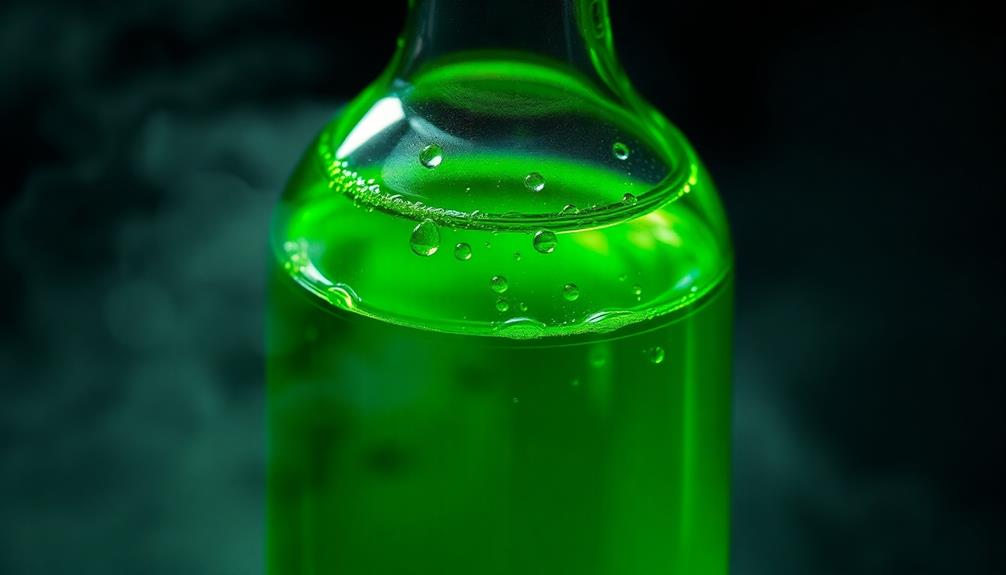
When you catch a whiff of antifreeze, it's hard to ignore that distinct sweet smell that resembles candy or maple syrup. This aroma can be a warning sign that something's not quite right with your vehicle. Antifreeze, also known as coolant, plays a crucial role in your engine's cooling system, helping to regulate temperatures and prevent overheating.
If you notice this sweet smell, especially after the engine's been running hot or when the heater's on, it could mean there's a leak somewhere. Common culprits include cracked hoses, a failing water pump, or even a malfunctioning heater core.
It's important to pay attention because these signs of an antifreeze issue could lead to serious problems if left unchecked.
Keep an eye out for heavy white vapor or steam coming from your tailpipe, too. This, combined with the sweet smell, could indicate a blown head gasket, which requires immediate attention.
Regularly checking your coolant levels and addressing any unusual smells can save you from significant engine damage and costly repairs. So, next time you catch that sweet whiff, take it seriously!
Description of the Smell
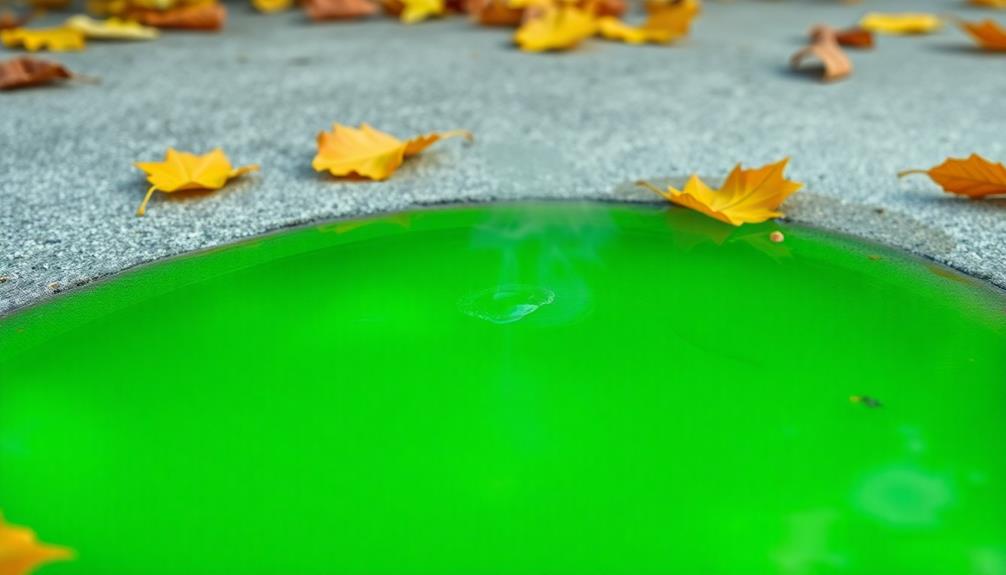
The unmistakable odor of antifreeze is often described as sweet and syrupy, reminiscent of candy or maple syrup. You might notice this distinct sweet smell when there's a coolant leak, especially if the engine is hot. This scent can waft through your car, signaling a possible problem in the cooling systems.
If you catch a strong antifreeze smell inside your vehicle, it could mean a bad heater core. This might lead to steam or vapor entering the cabin, making for an uncomfortable ride.
Keep an eye out for other signs, like engine overheating or a sudden loss of coolant. These could indicate a more serious issue, such as a cracked head gasket.
Be cautious! Prolonged exposure to that sweet smell isn't just a nuisance; it can be a sign of leaks that could cause significant engine damage if not addressed promptly.
Always inspect your vehicle if you detect this odor, as it's essential for your car's health and your safety. Pay attention to the smell of engine coolant, and don't hesitate to seek help if you suspect a problem. Your car will thank you!
Source and Composition
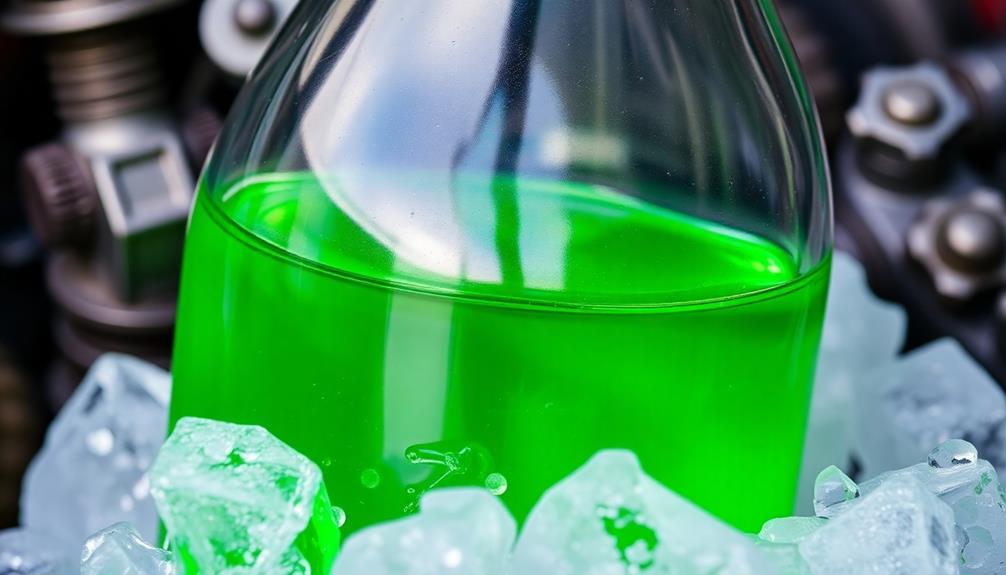
Antifreeze typically contains two main components: ethylene glycol and propylene glycol. Both of these substances give antifreeze its distinct sweet smell, much like candy or maple syrup. This sweet scent can be a clue that there's a problem, as it often indicates coolant leaks.
If you notice this smell, it's essential to check your coolant level, as a leak somewhere could lead to serious engine damage. Additionally, be aware that coolant leaks can cause overheating, which may result in costly engine repairs if not addressed promptly. In some cases, drivers may confuse the smell of coolant with the freon gas odor characteristics present in air conditioning systems, so it’s important to accurately identify the source of the problem. If you’re unsure, it’s always best to consult with a professional mechanic to avoid further complications.
Ethylene glycol is the most common ingredient in antifreeze, but it's toxic to humans and animals. That's why it's crucial to take any antifreeze smell seriously. While propylene glycol is less harmful, the sweet smell remains a consistent characteristic of most engine coolants.
Different antifreeze formulations may have additives that can slightly change the scent, but the sweet smell is usually there.
If you detect a strong antifreeze odor, don't ignore it! Promptly inspecting your vehicle can help you find and address coolant leaks before they lead to costly repairs.
Typical Scenarios or Environments
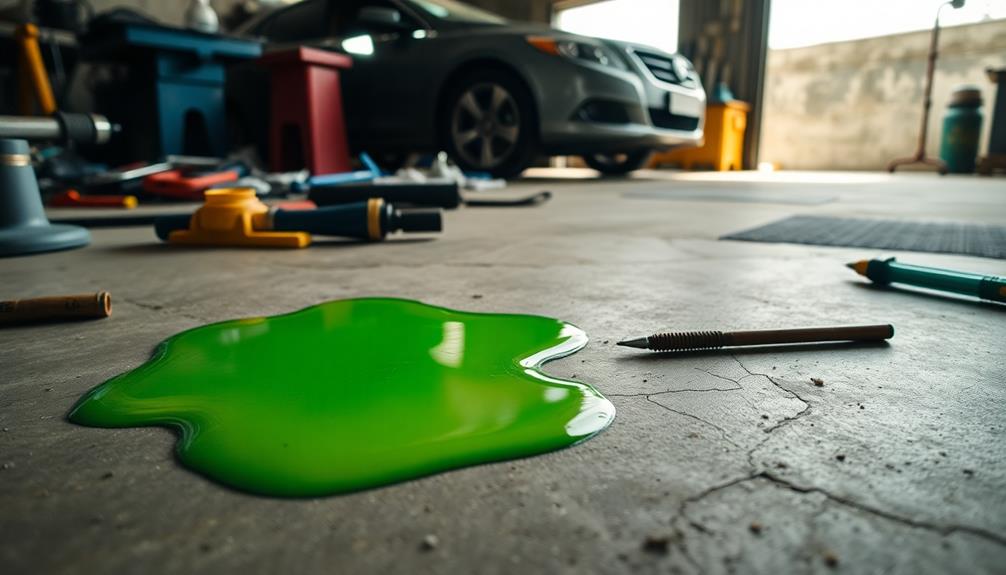
In garages, especially during colder months, you might notice the sweet smell of antifreeze lingering after parking your vehicle. This distinct antifreeze smell is often a sign of a leak, especially if your engine is running hot. When the coolant leaks, the heat can make the sweet smell even stronger, filling the air around you.
You may find this odor on the garage floor, where the leak might've pooled. If there's a problem with the heater core, you could also catch a whiff of that sweet smell inside the cabin of your vehicle.
It's a good idea to pay attention to this odor, as prolonged exposure can lead to headaches or even a burning sensation in your eyes.
If you start to notice the antifreeze smell frequently, don't ignore it. It's important to check for leaks or get your vehicle inspected.
Remember, keeping your car in good shape not only prevents those sweet odors but also helps ensure your vehicle runs smoothly.
Emotional or Cultural Associations

Nostalgia often wafts through the air with the sweet, syrupy scent of antifreeze, recalling childhood memories of family road trips and car rides. When you smell something familiar, it can stir up feelings of warmth and coziness, especially as seasons change. Families often gather to prepare their cars for winter, and that sweet smell coming from antifreeze reminds you of those special times.
However, the scent can also bring about mixed emotions. It might trigger thoughts of vehicle maintenance responsibilities, reminding you that keeping a car in good shape is essential. You might feel anxious, knowing that ignoring this sweet smell could lead to major problems, like unexpected vehicle failures. Those financial considerations can weigh heavily on your mind.
In literature and films, antifreeze often symbolizes danger or toxicity, creating emotional tension. You might remember scenes where that sweet smell signals trouble ahead.
Health or Safety Considerations

The sweet smell of antifreeze can evoke warm memories, but it's important to recognize the health and safety risks associated with it. If you catch a whiff of that distinct antifreeze smell, it could signal a coolant leak. This isn't just a minor issue; it can lead to serious mechanical problems like engine overheating. You should take immediate action if you notice this odor.
Prolonged exposure to antifreeze can cause irritation, such as headaches or burning sensations in your eyes. Sensitive individuals may feel these effects even more intensely.
Plus, antifreeze is toxic if ingested, posing health risks, especially to pets and children. That's why it's crucial to handle and store antifreeze carefully, keeping it away from living areas.
If you detect a strong antifreeze odor, don't ignore it! This could indicate underlying mechanical issues that might lead to safety risks while driving.
Always investigate the source of the smell right away to ensure your vehicle is safe and functioning properly. Remember, taking prompt action can save you from bigger problems down the road!
Final Thoughts

Recognizing the distinctive sweet smell of antifreeze can be crucial for your vehicle's health and safety. When you catch a whiff of that antifreeze smell, it's a signal to pay attention. This sweet aroma might mean there's an antifreeze leak in your cooling system, which can lead to engine overheating and serious engine damage if not checked promptly.
Vehicle owners should be aware that antifreeze leaks can sometimes be sneaky, not leaving visible fluid on the ground. If you notice the sweet smell along with your engine running hotter than usual or your heater not working properly, it's time for an urgent inspection.
To keep your car in good shape, make it a habit to monitor coolant levels regularly. This will help you catch any potential issues early.
Frequently Asked Questions
What Kind of Smell Does Antifreeze Have?
When you encounter antifreeze, you'll notice a distinct, sweet smell, often reminiscent of candy or maple syrup. If it's particularly strong, it might indicate a leak in your vehicle's cooling system.
What Smells Like Antifreeze in House?
If you smell something resembling antifreeze in your house, it might be due to leaks in your heating system or a spill that's evaporating. Don't ignore it; check for potential health hazards immediately.
Does Antifreeze Smell Like Maple Syrup?
Yes, antifreeze does smell like maple syrup. That sweet scent often indicates a leak, so if you notice it, check your vehicle immediately. Remember, antifreeze is toxic, so handle it carefully around pets and children.
Can Smell Antifreeze but No Leak?
You can smell antifreeze without seeing a leak due to small leaks evaporating coolant or environmental factors mimicking the scent. Regularly check coolant levels and inspect for residue to confirm any potential issues.
